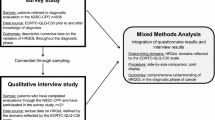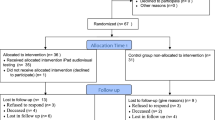Abstract
Purpose
The aims of this study were to investigate the impact of individual health-related quality of life (HRQL) evaluation on the attention towards symptom control and psychosocial function in advanced cancer patients.
Methods
Patients with advanced lung cancer or mesothelioma who attended a pulmonary oncology outpatient clinic were randomized to either of two strategies for HRQL assessment. The experimental group (EG) answered the EORTC QLQ-C30 + LC13 questionnaire using a digital table interface, with outprint of aggregated scale scores presented to the consulting physician as a support for evaluation. The control group (CG) answered a paper version of the same questionnaire, which was stored for later analysis. Consultations were audio-recorded. Outcome measures were a quantitative content analysis of audio-recorded consultations and medical and psychosocial interventions abstracted from clinical records.
Results
One hundred seventy-one patients were randomized and participated in the study. Issues regarding emotional function were more frequently discussed during consultations in the EG (p < 0.05). Similarly, interventions directed to emotional and social concerns were more frequent in the EG (p = 0.013 and p = 0.0036, respectively). HRQL measures over time were similar across the groups.
Conclusion
Individual HRQL assessment increased the attention to psychosocial functioning in patients with chest malignancies.

Similar content being viewed by others
References
Porzsolt F, Tannock I (1993) Goals of palliative cancer therapy. J Clin Oncol 11:378–381
Soni MK, Cella D, Masters GA, Burch SP, Heyes A, Silberman C (2002) The validity and clinical utility of symptom monitoring in advanced lung cancer: a literature review. Clin Lung Cancer 4:153–160
Levinson W, Roter D (1995) Physicians’ psychosocial beliefs correlate with their patient communication skills. J Gen Intern Med 10:375–279
Detmar SB, Muller MJ, Wever LDV, Schornagel JH, Aaronson NK (2001) Patient–physician communication during outpatient palliative treatment visits: an observational study. JAMA 285:1351–1357
Taenzer P, Bultz BD, Carlson LE, Speca M, DeGagne T, Olson K, Doll R, Rosberger Z (2000) Impact of computerized quality of life screening on physician behaviour and patient satisfaction in lung cancer outpatients. Psycho-Oncology 9:203–213
Aaronson NK, Ahmedzai S, Bergman B et al (1993) The European Organization for Research and Treatment of Cancer QLQ-C30: a quality-of-life instrument for use in international clinical trials in oncology. J Nat Cancer Inst 85:365–376
Osoba D, Zee B, Pater J, Warr D, Kaizer L, Latreille J (1994) Psychometric properties and responsiveness of the EORTC quality of life questionnaire (QLQ-C30) in patients with breast, ovarian and lung cancer. Qual Life Res 3:353–364
de Haes J, Curran D, Young T et al (2000) Quality of life evaluation in oncological clinical trials—the EORTC model. The EORTC Quality of Life Study Group. Eur J Cancer 36:821–825
Tishelman C, Lövgren M, Broberger E, Hamberg K, Sprangers MA (2010) Are the most distressing concerns of patients with inoperable lung cancer adequately assessed? A mixed-methods analysis. J Clin Oncol 28:1942–1949
Westman G, Bergman B, Albertsson M et al (1999) Megestrol acetate in advanced, progressive, hormone-insensitive cancer: effects on the quality of life. A placebo-controlled, randomized multi-centre trial. Eur J Cancer 35:586–595
von Plessen C, Bergman B, Andresen O et al (2006) Palliative chemotherapy beyond three courses conveys no survival or consistent quality-of-life benefits in advanced non-small cell lung cancer. Br J Cancer 95:966–973
Hermes A, Bergman B, Bremnes R et al (2008) Irinotecan plus carboplatin versus oral etoposide plus carboplatin in extensive small-cell lung cancer—a randomized phase III trial. J Clin Oncol 26:4261–4267
EORTC Group for Research into Quality of Life (2012) Bibliography. Available at http://groups.eortc.be/qol/documentation_bibliography.htm. Accessed 26 Feb 2012
Bjordal K, De Graeff A, Fayers PM et al (2000) A 12 country field study of the EORTC QLQ-C30 (version 3.0) and the head and neck cancer specific module (EORTC QLQ-H&N35) in head and neck patients. EORTC Quality of Life Group. Eur J Cancer 36:1796–1807
Bergman B, Aaronson NK, Ahmedzai S, Kaasa S, Sullivan M (1994) The EORTC QLQ-LC13: a modular supplement to the EORTC Core Quality of Life Questionnaire (QLQ-C30) for use in lung cancer clinical trials. EORTC Study Group on Quality of Life. Eur J Cancer 30A:635–642
Nicklasson M, Bergman B (2007) Validity, reliability and clinical relevance of EORTC QLQ-C30 and LC13 in patients with chest malignancies in a palliative setting. Qual Life Res 16:1019–1028
Bergman B, Nicklasson M, Sullivan M (1995) Can quality-of-life data be used prospectively in the treatment of cancer patients? 5th Nordic Conference in Psychosocial Oncology, Gothenburg (conference abstract in Swedish)
Fayers P, Aaronson NK, Bjordal K, Curran D, Groenvold M, on behalf of the EORTC Quality of Life Study Group (2001) EORTC QLQ-C30 scoring manual, 3rd edn. EORTC Quality of Life Group, Brussels
Michelson H, Bolund C, Nilsson B, Brandberg Y (2000) Health-related quality of life measured by the EORTC QLQ-C30—reference values from a large sample of Swedish population. Acta Oncol 39:477–484
Ong LM, Visser MR, Kryver IP et al (1998) The Roter Interaction Analysis System (RIAS) in oncological consultations: psychometric properties. Psycho-Oncology 7:387–401
Osoba D, Rodrigues G, Myles J, Zee B, Pater J (1998) Interpreting the significance of changes in health-related quality-of-life scores. J Clin Oncol 16:139–144
Detmar SB, Muller MJ, Schornagel JH, Weger LDV, Aaronson NK (2002) Health-related quality-of-life assessments and patient–physician communication. A randomized controlled trial. JAMA 288:3027–3034
Velikova G, Booth L, Smith AB, Brown PM, Lynch P, Brown JM, Selby PJ (2004) Measuring quality of life in routine oncology practice improves communication and patient well-being: a randomized controlled trial. J Clin Oncol 22:714–724
Hilarius DL, Kloeg PH, Gundy CM, Aaronson NK (2008) Use of health-related quality-of-life assessments in daily clinical oncology nursing practice. Cancer 113:628–637
Velikova G, Keding A, Harley C, Cocks K, Booth L, Smith AB, Wright P, Selby PJ, Brown JM (2010) Patients report improvements in continuity of care when quality of life assessments are used routinely in oncology practice: secondary outcomes of a randomised controlled trial. Eur J Cancer 46:2381–2388
Rosenbloom SK, Victorson DE, Hahn EA, Peterman AH, Cella D (2007) Assessment is not enough: a randomized controlled trial of the effects of HRQL assessment on quality of life and satisfaction in oncology practice. Psycho-Oncology 16:1069–1079
Mills ME, Murray LJ, Johnston BT, Cardwell C, Donnelly M (2008) Does a patient-held quality-of-life diary benefit patients with inoperable lung cancer? J Clin Oncol 27:70–77
Petersen MA, Groenvold M, Aaronson NK et al (2011) Development of computerized adaptive testing (CAT) for the EORTC QLQ-C30 physical functioning dimension. Qual Life Res 20:479–490
Acknowledgments
Statistician Nils-Gunnar Pehrsson is acknowledged for his guidance and performance of the statistical analyses. Helena Michelson, Ph.D., is acknowledged for her help with the validation of the consultation content categorization. The study was made possible by grants from the Swedish Cancer Society and from the University of Gothenburg.
Conflicts of interest
There exist no conflicts of interest.
Author information
Authors and Affiliations
Corresponding author
Rights and permissions
About this article
Cite this article
Nicklasson, M., Elfström, M.L., Olofson, J. et al. The impact of individual quality of life assessment on psychosocial attention in patients with chest malignancies: a randomized study. Support Care Cancer 21, 87–95 (2013). https://doi.org/10.1007/s00520-012-1496-6
Received:
Accepted:
Published:
Issue Date:
DOI: https://doi.org/10.1007/s00520-012-1496-6




